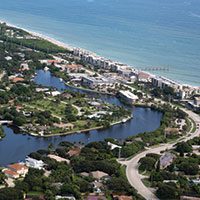 Pilot project would pump sea water into Bethel Creek
Pilot project would pump sea water into Bethel Creek
STORY
If County Commissioner Tim Zorc gets his way, fresh Atlantic Ocean water may soon flow through large pipes under Jaycee Park into Bethel Creek, refreshing a particularly stagnant part of the Indian River lagoon in a way that will benefit marine life and the local ecology.
Zorc presented details of the pilot project he has in mind at a public meeting he organized at Bethel Creek house shortly before last week’s election. In that balloting, Zorc won another four-year term on the County Commission.
The goal of the 89-day pilot project he is proposing would be to determine whether flushing Bethel Creek with sea water, before it drains into the endangered Indian River Lagoon, might improve water quality enough to justify a full-scale, long-term project.
Zorc said Bethel Creek is in “a slow decline because of the stormwater runoff and drainage from parking lots and buildings along a mile-plus stretch of highway A1A.”
The creek also receives groundwater contaminated by leaking septic systems in surrounding neighborhoods, although many of those are being replaced with a new sewer system being installed by the city.
The Bethel Creek project is modeled on a similar one in Destin, Florida, that successfully cleaned up Destin Harbor, and a member of Destin’s Stormwater Management staff has visited Indian River County to consult on the plan.
Zorc asked agencies monitoring the Destin project whether they would recommend the concept, now that it has been under way for a number of years in northern Florida, and they said they were very happy with the project.
“This would be a joint project among all the entities along this portion of the lagoon, including but not limited to the County, City of Vero Beach, Indian River Shores, St. Johns River Water Management District, and the Florida Inland Navigation District,” Zorc said.
The pilot project would last 89 days for a good reason: A water project that continues for 90 days or more is considered permanent and has far more complicated, costly and time-consuming permitting requirements.
A resident who lives nearby described Bethel Creek, which is actually an inlet on the lagoon, as “basically stagnant,” with very little water movement.
The pilot project, as proposed, would utilize existing drainage pipes to pump ocean water into the Bethel Creek. Which pipes are best suited to the project, how much water would be pumped, and the size and location of the pump have yet to be determined, and would be based on input from permitting agencies and government departments involved.
To establish a baseline, water characteristics would be monitored at several control points three months before, during, and three months after the 89-day project period.
With the high-tech water moving equipment currently available, residents need not be concerned that noise and vibration from the operation would affect their quality of life, Zorc assured the audience.
The audience – city and county officials, residents of nearby neighborhoods, representatives of environmental agencies and individuals interested in the health of the lagoon – seemed mostly in favor of the concept.
“I think this is a very good idea,” said Herb Whittall, former chairman of the Vero Beach Utilities Commission. Bethel Creek and the Vero Beach Marina are mid-way between the Sebastian and Fort Pierce inlets, the closest sources of fresh ocean water. “[At present] we have no way of getting sea water here in the middle to help cleanse the lagoon from runoff that comes from roadways, parking lots and septic systems,” Whittall said.
“I think the community response was positive,” said Zorc. “And I believe the technical and permitting requirements aren’t insurmountable. I just heard from our Coastal Engineer that the updated survey data required every year by the FDEP has been done, as of July,” so the Bethel Creek project will have the data it needs without the cost of a separate survey.








